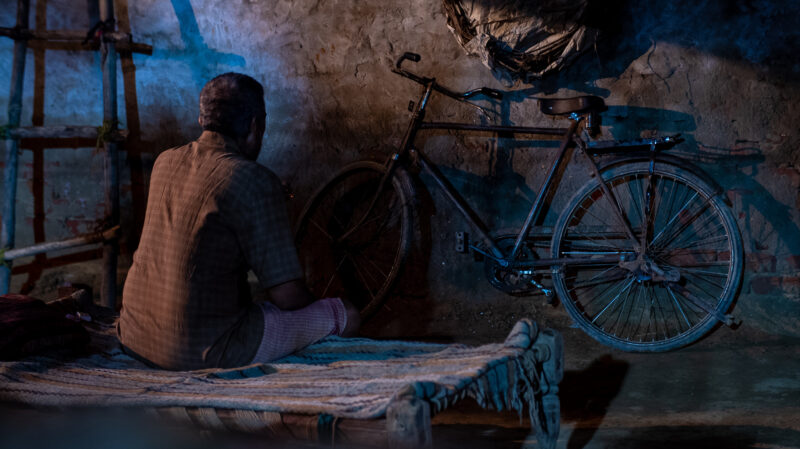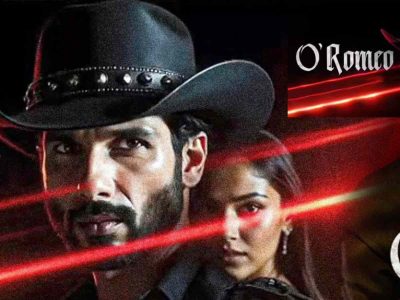Producer, actor, director and screenwriter Prakash Jha is known mostly known for his political films such as Damul, Mrityudand, Gangaajal, Apaharan, Raajneeti, Aarakshan Chakravyuh and Satyagraha. His recent film Mattoo Ki Saikal has the 70-year-old Jha playing the protagonist—a daily wage construction labourer living in a remote rural village, who struggles to support his family relying on his battered 22-year-old bicycle.
Patriot: Tell our readers your experience of acting as a protagonist in the film Mattoo ki Saikal.
Jha: M Gani wrote the script and screenplay of the film and sent it to me. When I read it, I completely fell for it, because it was a piece of pure cinema. There was no trickery or hoodwinking involved, no creation of any kind of false emotion—just reality as it is. In my initial years, I had myself made films with this kind of conviction. After a long time, I had come across a script like this.
I was surprised when the script was presented to me, not for the sake of production but for the consideration of being an actor in it. I had long discussions with Gani about why he thought I should be the film’s protagonist, and he had his reasons. He knew that I had acted in films before, and he thought that I have the understanding of the milieu, the character, the ethos and the pain of the class depicted in the film—which is a fact.
I have been born and brought up in such a setting, have been around such people, and am connected to a small town or village. So, I could very much relate to it. But of course, the process of getting into the character of Mattoo, and becoming him was an entirely wonderful exercise for me. It took months, but I got there.

Patriot: The film is set in a remote rural village in Mathura. Tell us more about the experience of shooting the film.
Jha: I went to Mathura several times, meeting Gani and his troupe as well as spending time with daily wage labourers. Eventually, in the third of fourth trip, I started spending time acting, behaving and being like a labourer who is depicted in the film. That was the physical process, but mentally also to prepare for a character like this—as a writer or filmmaker, one carries a different kind of intellect and class equity, all of which we have to shed in becoming that character.
I was personally very satisfied with the film. I concentrated on my part, which was to just play the character. I had terrific co-actors supporting me, all of whom were local. They had the command over the language and the milieu, and I had to blend into that ambience. They all helped me a lot, it was amazing.
Patriot: How long did it take to make the film?
Jha: The preparation took a couple of months. My preparation for the character took about five months. It wasn’t five concentrated months; I kept visiting and also kept working in my mind and also physically. Once we started shooting, it didn’t take long. We finished shooting in just 23-24 days. It was ready within three months’ time after the shoot.
Reportedly, the film is inspired by an event in M Gani’s father’s life.
Patriot: Tell us more about the idea and inspiration behind the film and its story of a daily wager and his cycle.
Jha: It’s a true story. Gani wrote the story about how his father struggled to buy a second-hand bicycle.
Patriot: What is the key message that you hope viewers will take back from the film?
Jha: Honestly, I’m only the actor in the film. The creator, communicator is the director.
Patriot: What is the response you have received so far for the film? How is its box office performance?
Jha: The film’s world premiere was at the 25th Busan International Film Festival in 2020. Thereafter, it had its US premiere at the 17th South Asian International Film Festival 2020. It is still being invited to various other festivals. We needed to release this film in the cinemas. We got together with PVR and we have done a limited release, and it has been appreciated by whoever has seen it. It has done averagely well as far as the audience is concerned.
We are hoping that it will eventually come on the OTT platforms and satellite, and more and more people will watch it. Ultimately, it’s not a film in the popular genre or an entertainment film, it’s a different kind of meaningful cinema.
Patriot: What projects are you working on next? Do you plan to act in more films in the future too?
Jha: At the moment, I am finishing writing my feature film, which is slated to be shot early next year. Right now, we are also preparing to shoot another web series called Lal Batti. I enjoy acting, and will definitely act more in the future. There are many proposals, and I am reading some scripts.
Patriot: Since Patriot is a Delhi-based newspaper, tell our readers a little about your personal connection with the capital city?
Jha: I studied at the Delhi University’s Ramjas College. I began studying physics, and I quit midway. Later, I was again in Delhi for about three years doing quite a lot of television work on the classical dance forms of India, a television series. Mungerilal ke Haseen Sapne, which I directed, was also shot in Delhi. So, I have very fond memories of Delhi, and I know the city very well.
Instagram: instagram.com/thepatriot_in/
Twitter: twitter.com/Patriot_Delhi
Facebook: facebook.com/Thepatriotnewsindia




